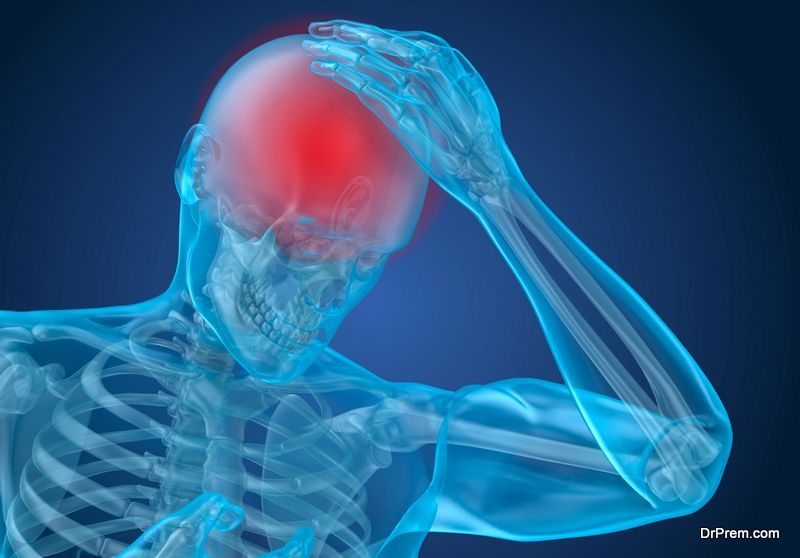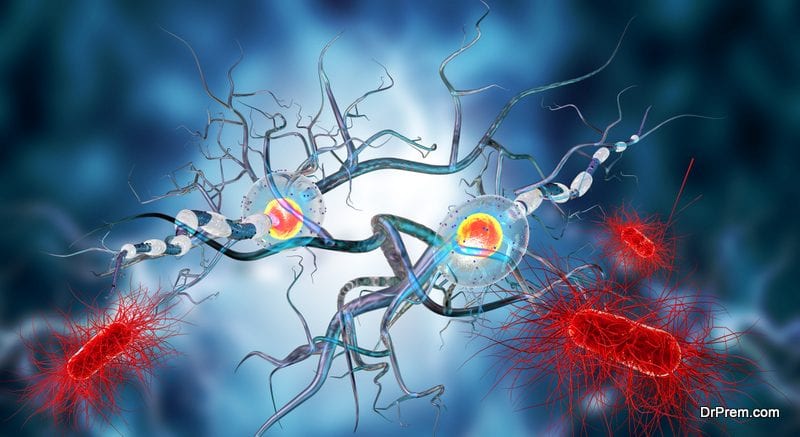More than 38 million Americans suffer from migraine headaches, with nearly 11 million of those claiming that their migraines cause mild to severe dabilitiations. Migraines can occur without warning and are accompanied by some tell-tale symptoms including pain, sensitivity to light or sound, nausea, blurred vision, and dizziness. Symptoms can last anywhere from several hours to several days, depending on the person and the severity of the migraine. But what causes these painful and debilitating headaches and how can you treat them? Read on to find out.
Migraine Causes
 There’s no clear-cut answer to this questions. Doctors are still struggling to identify a specific cause of migraine headaches but believe that genetics and chemical imbalances in the brain may play a role. Several factors may put you at greater risk for migraine headaches, including:
There’s no clear-cut answer to this questions. Doctors are still struggling to identify a specific cause of migraine headaches but believe that genetics and chemical imbalances in the brain may play a role. Several factors may put you at greater risk for migraine headaches, including:
Age
The onset of migraines generally begins in the teen years and peaks after the age of 30. You’ll see a decline in frequency and severity as you age.
Gender
 Sorry ladies, but women are nearly 3 times more likely to experience these types of headaches than men.
Sorry ladies, but women are nearly 3 times more likely to experience these types of headaches than men.
Genes
If someone in your family is prone to migraine headaches, this could put you at greater risk for experiencing them as well.
Chemicals and Nerves
 A nerve in your head known as the trigeminal nerve is responsible for the feelings you have in your face and considered a pathway for pain. This nerve also controls your eyes and mouth. When serotonin levels in your body drop, this nerve may release chemicals (or neurotransmitters) that travel to your brain and trigger feelings of pain.
A nerve in your head known as the trigeminal nerve is responsible for the feelings you have in your face and considered a pathway for pain. This nerve also controls your eyes and mouth. When serotonin levels in your body drop, this nerve may release chemicals (or neurotransmitters) that travel to your brain and trigger feelings of pain.
Stress
It’s no secret that stress causes countless side effects that negatively impact daily function and migraine headaches may be one of them. When you experience stress or anxiety; your body releases chemicals, including cortisol. Tension experienced during stress can cause and intensify migraine pain.
Hormones
 The hormone estrogen, in women, is responsible for a development of the reproductive system and controls feelings and emotions. The presence of estrogen is said to either worsen or lessen the effects of migraines. Taking (or stopping) birth control pills or using hormone replacement therapy may help the condition
The hormone estrogen, in women, is responsible for a development of the reproductive system and controls feelings and emotions. The presence of estrogen is said to either worsen or lessen the effects of migraines. Taking (or stopping) birth control pills or using hormone replacement therapy may help the condition
Foods and Food Intake
What you eat (or don’t eat) may actually trigger a migraine. Skipping meals is never recommended, but if you’re prone to migraine headaches, eating throughout the day is especially important. A skipped meal causes your blood sugar levels to plummet, which may trigger a migraine. Certain food may increase your likelihood to experience a migraine also. These include foods containing MSG and aspartame, as well as processed foods and those containing too much sodium. Indulging in too much caffeine or alcohol may also trigger migraines.
Medications
 While medications are designed to help treat symptoms, sometimes, the side effects can be worse than the issue they’re treating. Using too much over the counter pain and migraine medications over an extended period of time may cause a rebound headache.
While medications are designed to help treat symptoms, sometimes, the side effects can be worse than the issue they’re treating. Using too much over the counter pain and migraine medications over an extended period of time may cause a rebound headache.
Weather
Believe it or not, but the air pressure outside has a lot to do with how you feel internally. When there’s a significant dip or rise in temperature, it causes an imbalance in brain chemicals. This imbalance can bring on a migraine.
Intense Exercise
 If you just started a new exercise regime or are looking to “up” your game, be sure to go slow and increase intensity gradually. That’s because a workout that is overly intense may cause a migraine. Movement can cause a migraine, therefore, an intense work involving lots of rotation, quick movements, bending down and standing up, or turning your head sharply, maybe causing yours.
If you just started a new exercise regime or are looking to “up” your game, be sure to go slow and increase intensity gradually. That’s because a workout that is overly intense may cause a migraine. Movement can cause a migraine, therefore, an intense work involving lots of rotation, quick movements, bending down and standing up, or turning your head sharply, maybe causing yours.
Light and Sound
You already know that light and sound sensitivity accompany most migraines. But did you know that these elements may actually cause their onset? For some people, very strong odors, bright or flashing lights, or loud sounds can bring a migraine headache to the surface. Things like a loud concert or headlights while driving are example of potential light and sound triggers.
Sleep Patterns
 Getting consistent, quality sleep is a struggle for most people but it’s extremely important if you suffer from migraine headaches. Disrupted sleep or a significant shift in sleep patterns can trigger a migraine. This includes changing shifts at work, experiencing jet lag, or waking and going to bed at different times than normal.
Getting consistent, quality sleep is a struggle for most people but it’s extremely important if you suffer from migraine headaches. Disrupted sleep or a significant shift in sleep patterns can trigger a migraine. This includes changing shifts at work, experiencing jet lag, or waking and going to bed at different times than normal.
Treatment Options
Now that you understand some of the many triggers and underlying factor that cause migraines, here are a few treatment options that can help.
Avoid the Triggers
 If you have a pattern of migraines, you’ve likely pinpointed your triggers. Whenever possible, avoid these at all costs. If loud sounds trigger yours, skip the concert or bring a pair of noise reducing headphones. Does excess alcohol trigger your headaches? Limit your intake when possible. Some triggers are unavoidable, but for those that are, make a conscious effort to steer clear.
If you have a pattern of migraines, you’ve likely pinpointed your triggers. Whenever possible, avoid these at all costs. If loud sounds trigger yours, skip the concert or bring a pair of noise reducing headphones. Does excess alcohol trigger your headaches? Limit your intake when possible. Some triggers are unavoidable, but for those that are, make a conscious effort to steer clear.
Medications and Supplements
Your doctor may recommend medication to help combat migraine pain and associated symptoms. Most medications are taken when migraine symptoms first appear. If your migraines are accompanied by blurred vision, take an over the counter pain reliever immediately. This could help lessen the headaches intensity. Prescription medications are sometimes used as well. CBD oil like FX CBD VAPE OIL may help reduce inflammation associated with migraines and restore your brain’s chemical balance.
Rest
 One of the best things you can do for treating migraine headaches is rest. Migraines can last as few as several hours to as long as several days. In these cases, a person’s entire life is turned upside down. They can’t work and can barely function. Resting in a dark, quiet room can lessen the intensity including the pain and the reaction to external elements. You can apply ice to your head or over your eyes to help dull or numb the pain. This also removes heat from the affected area, relieving pressure and discomfort.
One of the best things you can do for treating migraine headaches is rest. Migraines can last as few as several hours to as long as several days. In these cases, a person’s entire life is turned upside down. They can’t work and can barely function. Resting in a dark, quiet room can lessen the intensity including the pain and the reaction to external elements. You can apply ice to your head or over your eyes to help dull or numb the pain. This also removes heat from the affected area, relieving pressure and discomfort.
Final note
If you’ve never experienced a migraine headache, consider yourself lucky. They are some of the most intense headaches a person can encounter. The good news is, with the right knowledge, tools, and behavior; you can prevent the onset of these headaches and live a normal, healthy life.
Article Submitted By Community Writer




